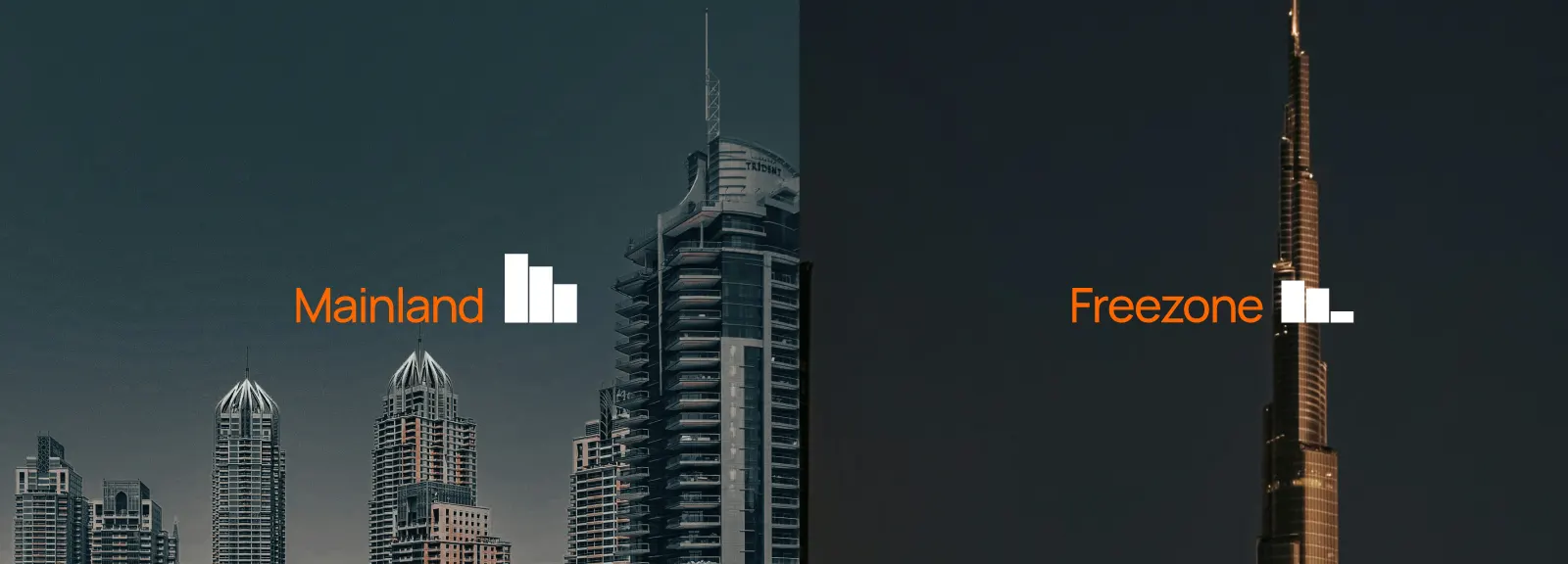Setting up a DIFC holding company is one of the most effective ways to protect wealth, centralize international investments, and gain access to the UAE's double tax treaty network. But in 2025, global tax rules have tightened. Just having a registered company isn’t enough. To access the benefits of UAE tax residency, you need real, measurable substance. That means physical presence, control over decisions, and day-to-day activity that proves the DIFC holding company isn't just a shell entity.
In this blog, we explain how substance is assessed in the UAE, why it’s crucial for your DIFC holding company, and how to build a structure that holds up under scrutiny from both local regulators and foreign tax authorities. We’ll walk you through compliance with the UAE’s Economic Substance Regulations (ESR), practical steps to reinforce local operations, and how to avoid red flags that lead to rejections or double taxation. We also show how DIFC Foundations and clear governance structures can strengthen your position long-term.
Table of Contents
Why Substance Now Matters More Than Ever

Tax authorities around the world have become more aggressive in challenging residency claims. The OECD’s Base Erosion and Profit Shifting (BEPS) measures and automatic exchange of information through CRS have changed the landscape. If your DIFC holding company doesn’t have economic substance in the UAE, you may lose access to tax treaty benefits, or worse, face double taxation.
Here’s why substance matters in 2025:
1. CRS Data Sharing Is Fully Operational
UAE financial institutions are now automatically sharing account holder information with over 100 countries as part of the Common Reporting Standard (CRS). If your DIFC holding company is listed with no clear UAE presence, it triggers scrutiny.
2. OECD Pressures Are Shaping Local Policy
The UAE has strengthened ESR enforcement due to international expectations. Entities without real operations are now being rejected for Tax Residency Certificates.
3. DIFC Holding Companies Without Substance Are Being Flagged
Tax authorities in Europe and Asia are rejecting UAE residency claims from entities that have no physical footprint in the UAE.
What Makes a DIFC Holding Company Unique

A DIFC holding company offers more than just a prestigious business address, it provides a globally respected legal environment, a zero-tax regime for qualifying income, and a strategic foothold in one of the world’s most stable financial centers. In 2025, it remains the preferred choice for wealth structuring, cross-border asset holding, and international tax planning, but only when the structure is built with substance.
Here’s why the DIFC holding company continues to stand out:
1. Globally Respected Regulatory Framework
The DIFC operates under its own civil and commercial laws, modeled on English common law. This makes a DIFC holding company particularly attractive to international investors and family offices, especially those coming from common law jurisdictions like the UK, Singapore, or Hong Kong.
The DIFC Registrar of Companies (RoC) is known for strong corporate governance and transparent compliance procedures both essential for holding structures that need to demonstrate substance under tax scrutiny.
2. Ideal for Cross-Border Holdings
A DIFC holding company can own equity in onshore UAE entities, other free zone companies, and foreign subsidiaries. This makes it an effective vehicle for consolidating global business interests under one parent company in a neutral, tax-friendly jurisdiction.
Crucially, there is no restriction on holding foreign assets whether it’s shares, real estate, or intellectual property. The DIFC holding company can also distribute dividends, receive royalties, or reinvest capital across borders with minimal friction.
3. No Corporate Tax on Passive Income (with ESR compliance)
As of 2025, UAE corporate tax applies at 9%, but a DIFC holding company can still benefit from a 0% tax rate on qualifying passive income (like dividends or capital gains), as long as it meets the requirements under the UAE’s Economic Substance Regulations.
This is especially valuable for international businesses using a DIFC structure to optimize group-level tax exposure without triggering GAAR or CFC challenges in home countries as long as they can prove the structure has real presence.
4. Robust Double Tax Treaty Access
A properly structured DIFC holding company with substance is eligible to apply for a UAE Tax Residency Certificate (TRC). This unlocks access to the UAE’s network of 140+ double tax treaties, helping reduce or eliminate withholding tax on dividends, interest, and royalties from other jurisdictions.
However, these treaties increasingly require proof that the UAE entity is not a “conduit”, so having a DIFC address alone isn’t enough. You must demonstrate real operations and decision-making inside the UAE, which the DIFC infrastructure helps support.
Keep in mind, tax residency benefits depend on more than location. Proper corporate tax registration is part of the foundation and it’s simpler than most people think.
5. Efficient Setup and Ongoing Administration
Unlike offshore jurisdictions where opacity raises red flags, the DIFC provides an internationally respected platform for legitimate, compliant corporate setups. A DIFC holding company can be incorporated in 7–10 working days, with options for 100% foreign ownership, multiple classes of shares, and bespoke constitutional documents.
Ongoing regulatory filings are streamlined through the DIFC portal, and the Registrar of Companies works in tandem with the UAE Ministry of Finance to ensure TRC issuance and ESR compliance can be handled efficiently when proper records are maintained.
6. Reputation and Bankability
International banks are increasingly cautious when onboarding offshore entities but a DIFC holding company, especially one with substance, is widely accepted. The combination of a physical UAE presence, DIFC jurisdiction, and audited financials makes account opening easier at both local and global banks.
Many international groups use their DIFC holding company to anchor their regional treasury operations or receive consolidated payments from global subsidiaries strengthening both operational efficiency and tax defensibility.
The Link Between Economic Substance and UAE Tax Residency

Establishing a DIFC holding company is a strong first step, but on its own, it does not guarantee UAE tax residency. In 2025, UAE tax residency is no longer just about where a company is registered; it’s about where it is effectively managed and controlled. This is where economic substance comes in.
A DIFC holding company must actively demonstrate that it has a real presence and ongoing operations within the UAE. This isn’t optional, it’s required by both UAE authorities and international tax standards, especially when applying for a Tax Residency Certificate (TRC) and accessing the UAE’s 140+ double tax treaties.
1. What the UAE Looks for in Tax Residency Claims
To qualify for a TRC, a DIFC holding company must prove that its core income-generating activities (CIGAs) are carried out in the UAE. These include:
- Holding board meetings physically in the UAE
- Making strategic decisions locally
- Having local infrastructure such as office space, staff, and banking
- Complying with the UAE’s Economic Substance Regulations (ESR)
The Ministry of Finance carefully examines supporting documents, lease agreements, utility bills, employee contracts, and financial records before issuing a TRC.
2. Why Substance Determines Access to Treaty Benefits
Even if the UAE grants your DIFC holding company a TRC, foreign tax authorities can challenge it if they believe the company is a “paper entity.” For example, if your directors live abroad and decisions are made outside the UAE, that raises a red flag.
Many countries, particularly in Europe, now apply Principal Purpose Tests (PPTs) or General Anti-Avoidance Rules (GAAR) to deny treaty benefits when a structure lacks real purpose and substance. Without a proper DIFC company formation strategy that aligns with substance requirements, your structure risks rejection.
3. What Tax Authorities Look for Globally
Foreign tax authorities are now checking if:
- The company is operating from a co-working space or using a P.O. box
- Directors are based in tax havens or outside the UAE entirely
- Board resolutions or financials reflect offshore activity
- UAE bank accounts show little or no transaction history
If any of these apply, your DIFC holding company could be labeled a “brass plate” or conduit entity and stripped of tax treaty benefits.
4. Local Control Is Non-Negotiable
Effective control means the company’s “mind and management” must be in the UAE. For a DIFC holding company, that includes:
- Appointing UAE-resident directors with real authority
- Ensuring board meetings are held within the DIFC or mainland UAE
- Making key decisions like investments, divestments, or dividends from within the country
- Ensuring documentation supports this control (board minutes, resolutions, IP logs, etc.)
Simply put, residency on paper is no longer enough. The DIFC company formation process must be followed by an operational strategy that gives the structure legal and economic credibility.
The UAE Economic Substance Regulations (ESR) Explained
The UAE Economic Substance Regulations (ESR) were introduced to align with international tax standards set by the OECD and to prevent companies from being used for profit shifting without genuine economic activity. These regulations apply to all UAE entities carrying out “Relevant Activities,” which includes holding company business.
If you have completed a DIFC company formation and established a DIFC holding company, it is critical to understand your ESR obligations in 2025.
What Activities Trigger ESR for Holding Companies?
ESR applies to nine Relevant Activities, including:
- Banking
- Insurance
- Investment fund management
- Lease-finance
- Headquarters business
- Shipping
- Intellectual property
- Distribution and service center
- Holding company business
A DIFC holding company that owns shares or assets in other companies is classified under holding company business and must meet ESR requirements.
Core ESR Requirements for DIFC Holding Companies
Holding companies have a simplified ESR test compared to other Relevant Activities but still must demonstrate genuine substance in the UAE. The key requirements are:
- Maintaining a physical office in the UAE. Virtual offices or P.O. boxes alone are insufficient.
- Holding board meetings in the UAE with directors physically present to make strategic decisions.
- Keeping comprehensive financial and operational records, including board minutes, shareholder resolutions, lease agreements, and accounting documents.
- Employing adequate staff locally, either as direct employees or through UAE-based outsourcing arrangements.
Meeting these requirements is essential for your DIFC holding company to be compliant with UAE ESR rules.
Annual ESR Notification and Reporting Obligations
Every year, a DIFC holding company must submit an ESR notification to the UAE Ministry of Finance declaring whether the entity conducts Relevant Activities. If it does, an ESR report detailing compliance measures must also be submitted.
Deadlines for submission are strict, and failure to file on time or accurately can result in penalties, regardless of whether the company meets substance requirements. Given how VAT filing now ties into corporate tax and ESR compliance, it’s a good move to align both. Check out our guide on VAT filing in UAE.
Penalties for Non-Compliance
UAE authorities have increased enforcement of ESR compliance. Penalties for failing to comply include:
- Fines ranging from AED 20,000 to AED 50,000 for initial offenses, such as late filing or incomplete reports.
- Repeated or serious violations can result in fines up to AED 400,000.
- Possible suspension or cancellation of the business license by the DIFC Registrar.
- Reporting of non-compliance to foreign tax authorities through international information exchange agreements.
Substance Requirements for Pure Holding Companies
Pure holding companies, those that only hold shares and do not engage in other commercial activities, benefit from a reduced ESR test. However, they still must maintain a minimum level of substance to avoid being classified as “shell companies.”
Even a pure DIFC holding company must:
- Maintain a registered physical office and valid lease in the UAE.
- Establish a clear governance framework through constitutional documents or foundations.
- Demonstrate actual management and control taking place within the UAE.
If you’re planning to expand your structure or launch operations, our step-by-step walkthrough on how to start a business in UAE in 2025 can help you build out correctly.
Audit and Cross-Border Disclosure Risks
The UAE Ministry of Finance can audit any DIFC holding company to verify ESR compliance. Additionally, under the Common Reporting Standard (CRS), information about ESR compliance may be shared with foreign tax authorities.
Failure to demonstrate economic substance can result in:
- Revocation of the UAE Tax Residency Certificate.
- Denial of tax treaty benefits by foreign jurisdictions.
- Exposure to additional taxation or penalties in your home country.
Ensuring your DIFC company formation includes a robust substance strategy from the outset is essential to navigate these regulations effectively in 2025.
How to Establish Real Substance for Your DIFC Holding Company

Real substance means showing that the company is genuinely based in the UAE. These are not theoretical checkboxes but practical steps that every DIFC holding company should consider.
To build substance, you need:
1. Physical Office Space
Lease an actual office in DIFC or the mainland. Virtual offices are no longer sufficient for proving presence. Choosing the right legal structure could make your office lease even more defensible. You can explore the pros and cons of a DIFC Foundation vs free zone company.
2. Resident Directors
Appoint directors who reside in the UAE and can demonstrate decision-making authority.
3. Hold Board Meetings in the UAE
Conduct meetings in-person or via UAE-based IP addresses, and document minutes.
4. Maintain a UAE Bank Account
A DIFC holding company must have a local bank account to show real operations.
5. Hire Local Staff or Outsource to UAE-Based Firms
Whether it’s legal, accounting, or admin work, involve UAE-based service providers.
6. Keep Clean and Accessible Records
Have board resolutions, lease documents, employee records, and utility bills available at all times.
7. Use Local Advisors for ESR Reporting
A specialized advisory firm under DIFC category 4 license can ensure all ESR filings are timely and correct.
Substance isn’t built overnight. But it’s essential for your DIFC holding company to be seen as a real business.
Before setting up your structure, read our guide on understanding the different types of business licenses in Dubai.
Red Flags That Can Undermine Your Tax Residency Claim

Tax authorities are trained to spot inconsistencies. A DIFC holding company that appears only on paper will raise suspicion.
Avoid these red flags:
1. Only Using Nominee Directors
If your directors have no real presence in the UAE, your structure lacks substance.
2. No Physical Premises or Employees
Shared workspaces or mail forwarding addresses won’t pass scrutiny in 2025.
3. No Documented Board Meetings or Resolutions
Failure to maintain records showing UAE-based management control.
4. Foreign-Led Decision Making
If all major decisions are taken abroad, the UAE entity may be ignored.
5. No UAE Bank Transactions
Payment flows outside the UAE suggest that your DIFC holding company is inactive.
Mismatch between registered activity and actual activity your company must only engage in the activities listed on its DIFC license.
In 2025, Substance Is Strategy
In today’s global tax environment, setting up a DIFC holding company is only the beginning. If you want real benefits from UAE tax residency, your company must operate with substance, structure, and sound governance.
That means having a real office, appointing local directors, using UAE service providers, and keeping your paperwork clean and updated. A DIFC holding company that can show substance will benefit from lower tax exposure, better banking relationships, and global credibility.
At GCG Structuring, we work with investors, families, and corporate groups to build tax-resident, compliant structures from the ground up. We handle ESR filings, local hiring strategies, governance planning, and documentation. Most importantly, we ensure that your DIFC holding company is built to last, defendable in audits, and positioned to grow.
If you’re planning a DIFC business setup , or you’re worried that your existing setup lacks substance, we can help.
FAQ
1. 0 Can a DIFC holding company own real estate in the UAE or abroad?
Yes. A DIFC holding company can legally hold real estate both inside and outside the UAE, provided it’s structured correctly. For UAE onshore property, approvals may be required from local land departments. Internationally, a DIFC holding company is often used to hold property across Europe, the UK, or Asia due to its recognized legal standing.
2. 0 Do I need to audit the financials of my DIFC holding company every year?
Audits are not always mandatory for a DIFC holding company, but many banks, tax authorities, and treaty partners expect clean financial records. In practice, having audited statements adds credibility, especially if you’re applying for a Tax Residency Certificate or opening international bank accounts.
3. 0 Can a DIFC holding company apply for a UAE Golden Visa?
A DIFC holding company itself cannot apply for a visa, but the shareholder or director may qualify based on business ownership. In 2025, company owners with qualifying capital and business activity in the UAE can often use their DIFC holding company as a basis to apply for a 10-year Golden Visa through investor pathways.
4. 0 Is it possible to migrate an existing offshore company into a DIFC holding company?
Yes. The DIFC Registrar of Companies allows for company continuation (also called re-domiciliation) from certain approved jurisdictions. If you’re holding assets in the BVI or Cayman and want more substance, migrating into a DIFC holding company can offer stronger legal protection and better access to UAE tax residency benefits.





